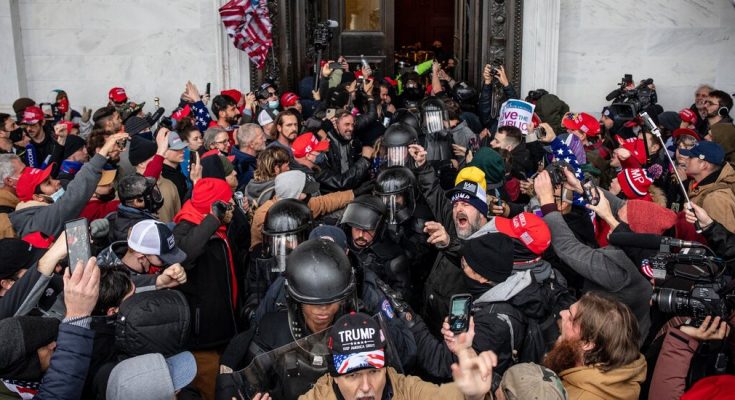The American Abyss
Written by By Timothy Snyder | Yale University History Professor | The New York Times
When Donald Trump stood before his followers on Jan. 6 and urged them to march on the United States Capitol, he was doing what he had always done. He never took electoral democracy seriously nor accepted the legitimacy of its American version.
Even when he won, in 2016, he insisted that the election was fraudulent — that millions of false votes were cast for his opponent. In 2020, in the knowledge that he was trailing Joseph R. Biden in the polls, he spent months claiming that the presidential election would be rigged and signaling that he would not accept the results if they did not favor him. He wrongly claimed on Election Day that he had won and then steadily hardened his rhetoric: With time, his victory became a historic landslide and the various conspiracies that denied it ever more sophisticated and implausible.
People believed him, which is not at all surprising. It takes a tremendous amount of work to educate citizens to resist the powerful pull of believing what they already believe, or what others around them believe, or what would make sense of their own previous choices. Plato noted a particular risk for tyrants: that they would be surrounded in the end by yes-men and enablers. Aristotle worried that, in a democracy, a wealthy and talented demagogue could all too easily master the minds of the populace. Aware of these risks and others, the framers of the Constitution instituted a system of checks and balances. The point was not simply to ensure that no one branch of government dominated the others but also to anchor in institutions different points of view.
In this sense, the responsibility for Trump’s push to overturn an election must be shared by a very large number of Republican members of Congress. Rather than contradict Trump from the beginning, they allowed his electoral fiction to flourish. They had different reasons for doing so. One group of Republicans is concerned above all with gaming the system to maintain power, taking full advantage of constitutional obscurities, gerrymandering and dark money to win elections with a minority of motivated voters. They have no interest in the collapse of the peculiar form of representation that allows their minority party disproportionate control of government. The most important among them, Mitch McConnell, indulged Trump’s lie while making no comment on its consequences.
Yet other Republicans saw the situation differently: They might actually break the system and have power without democracy. The split between these two groups, the gamers and the breakers, became sharply visible on Dec. 30, when Senator Josh Hawley announced that he would support Trump’s challenge by questioning the validity of the electoral votes on Jan. 6. Ted Cruz then promised his own support, joined by about 10 other senators. More than a hundred Republican representatives took the same position. For many, this seemed like nothing more than a show: challenges to states’ electoral votes would force delays and floor votes but would not affect the outcome.

Yet for Congress to traduce its basic functions had a price. An elected institution that opposes elections is inviting its own overthrow. Members of Congress who sustained the president’s lie, despite the available and unambiguous evidence, betrayed their constitutional mission. Making his fictions the basis of congressional action gave them flesh. Now Trump could demand that senators and congressmen bow to his will. He could place personal responsibility upon Mike Pence, in charge of the formal proceedings, to pervert them. And on Jan. 6, he directed his followers to exert pressure on these elected representatives, which they proceeded to do: storming the Capitol building, searching for people to punish, ransacking the place.
Of course this did make a kind of sense: If the election really had been stolen, as senators and congressmen were themselves suggesting, then how could Congress be allowed to move forward? For some Republicans, the invasion of the Capitol must have been a shock, or even a lesson. For the breakers, however, it may have been a taste of the future. Afterward, eight senators and more than 100 representatives voted for the lie that had forced them to flee their chambers.

Post-truth is pre-fascism, and Trump has been our post-truth president. When we give up on truth, we concede power to those with the wealth and charisma to create spectacle in its place. Without agreement about some basic facts, citizens cannot form the civil society that would allow them to defend themselves. If we lose the institutions that produce facts that are pertinent to us, then we tend to wallow in attractive abstractions and fictions. Truth defends itself particularly poorly when there is not very much of it around, and the era of Trump — like the era of Vladimir Putin in Russia — is one of the decline of local news. Social media is no substitute: It supercharges the mental habits by which we seek emotional stimulation and comfort, which means losing the distinction between what feels true and what actually is true.
Post-truth wears away the rule of law and invites a regime of myth. These last four years, scholars have discussed the legitimacy and value of invoking fascism in reference to Trumpian propaganda. One comfortable position has been to label any such effort as a direct comparison and then to treat such comparisons as taboo. More productively, the philosopher Jason Stanley has treated fascism as a phenomenon, as a series of patterns that can be observed not only in interwar Europe but beyond it.
My own view is that greater knowledge of the past, fascist or otherwise, allows us to notice and conceptualize elements of the present that we might otherwise disregard and to think more broadly about future possibilities. It was clear to me in October that Trump’s behavior presaged a coup, and I said so in print; this is not because the present repeats the past, but because the past enlightens the present.

Like historical fascist leaders, Trump has presented himself as the single source of truth. His use of the term “fake news” echoed the Nazi smear Lügenpresse (“lying press”); like the Nazis, he referred to reporters as “enemies of the people.” Like Adolf Hitler, he came to power at a moment when the conventional press had taken a beating; the financial crisis of 2008 did to American newspapers what the Great Depression did to German ones. The Nazis thought that they could use radio to replace the old pluralism of the newspaper; Trump tried to do the same with Twitter.
Thanks to technological capacity and personal talent, Donald Trump lied at a pace perhaps unmatched by any other leader in history. For the most part these were small lies, and their main effect was cumulative. To believe in all of them was to accept the authority of a single man, because to believe in all of them was to disbelieve everything else. Once such personal authority was established, the president could treat everyone else as the liars; he even had the power to turn someone from a trusted adviser into a dishonest scoundrel with a single tweet. Yet so long as he was unable to enforce some truly big lie, some fantasy that created an alternative reality where people could live and die, his pre-fascism fell short of the thing itself.

Some of his lies were, admittedly, medium-size: that he was a successful businessman; that Russia did not support him in 2016; that Barack Obama was born in Kenya. Such medium-size lies were the standard fare of aspiring authoritarians in the 21st century. In Poland the right-wing party built a martyrdom cult around assigning blame to political rivals for an airplane crash that killed the nation’s president. Hungary’s Viktor Orban blames a vanishingly small number of Muslim refugees for his country’s problems. But such claims were not quite big lies; they stretched but did not rend what Hannah Arendt called “the fabric of factuality.”
One historical big lie discussed by Arendt is Joseph Stalin’s explanation of starvation in Soviet Ukraine in 1932-33. The state had collectivized agriculture, then applied a series of punitive measures to Ukraine that ensured millions would die. Yet the official line was that the starving were provocateurs, agents of Western powers who hated socialism so much they were killing themselves. A still grander fiction, in Arendt’s account, is Hitlerian anti-Semitism: the claims that Jews ran the world, Jews were responsible for ideas that poisoned German minds, Jews stabbed Germany in the back during the First World War. Intriguingly, Arendt thought big lies work only in lonely minds; their coherence substitutes for experience and companionship.
In November 2020, reaching millions of lonely minds through social media, Trump told a lie that was dangerously ambitious: that he had won an election that in fact he had lost. This lie was big in every pertinent respect: not as big as “Jews run the world,” but big enough. The significance of the matter at hand was great: the right to rule the most powerful country in the world and the efficacy and trustworthiness of its succession procedures. The level of mendacity was profound. The claim was not only wrong, but it was also made in bad faith, amid unreliable sources. It challenged not just evidence but logic: Just how could (and why would) an election have been rigged against a Republican president but not against Republican senators and representatives? Trump had to speak, absurdly, of a “Rigged (for President) Election.”

The force of a big lie resides in its demand that many other things must be believed or disbelieved. To make sense of a world in which the 2020 presidential election was stolen requires distrust not only of reporters and of experts but also of local, state and federal government institutions, from poll workers to elected officials, Homeland Security and all the way to the Supreme Court. It brings with it, of necessity, a conspiracy theory: Imagine all the people who must have been in on such a plot and all the people who would have had to work on the cover-up.Capitol Riot Fallout
Trump’s electoral fiction floats free of verifiable reality. It is defended not so much by facts as by claims that someone else has made some claims. The sensibility is that something must be wrong because I feel it to be wrong, and I know others feel the same way. When political leaders such as Ted Cruz or Jim Jordan spoke like this, what they meant was: You believe my lies, which compels me to repeat them. Social media provides an infinity of apparent evidence for any conviction, especially one seemingly held by a president.
On the surface, a conspiracy theory makes its victim look strong: It sees Trump as resisting the Democrats, the Republicans, the Deep State, the pedophiles, the Satanists. More profoundly, however, it inverts the position of the strong and the weak. Trump’s focus on alleged “irregularities” and “contested states” comes down to cities where Black people live and vote. At bottom, the fantasy of fraud is that of a crime committed by Black people against white people.
It’s not just that electoral fraud by African-Americans against Donald Trump never happened. It is that it is the very opposite of what happened, in 2020 and in every American election. As always, Black people waited longer than others to vote and were more likely to have their votes challenged. They were more likely to be suffering or dying from Covid-19, and less likely to be able to take time away from work. The historical protection of their right to vote has been removed by the Supreme Court’s 2013 ruling in Shelby County v. Holder, and states have rushed to pass measures of a kind that historically reduce voting by the poor and communities of color.
The claim that Trump was denied a win by fraud is a big lie not just because it mauls logic, misdescribes the present and demands belief in a conspiracy. It is a big lie, fundamentally, because it reverses the moral field of American politics and the basic structure of American history.
When Senator Ted Cruz announced his intention to challenge the Electoral College vote, he invoked the Compromise of 1877, which resolved the presidential election of 1876. Commentators pointed out that this was no relevant precedent, since back then there really were serious voter irregularities and there really was a stalemate in Congress. For African-Americans, however, the seemingly gratuitous reference led somewhere else. The Compromise of 1877 — in which Rutherford B. Hayes would have the presidency, provided that he withdrew federal power from the South — was the very arrangement whereby African-Americans were driven from voting booths for the better part of a century. It was effectively the end of Reconstruction, the beginning of segregation, legal discrimination and Jim Crow. It is the original sin of American history in the post-slavery era, our closest brush with fascism so far.
If the reference seemed distant when Ted Cruz and 10 senatorial colleagues released their statement on Jan. 2, it was brought very close four days later, when Confederate flags were paraded through the Capitol.

Some things have changed since 1877, of course. Back then, it was the Republicans, or many of them, who supported racial equality; it was the Democrats, the party of the South, who wanted apartheid. It was the Democrats, back then, who called African-Americans’ votes fraudulent, and the Republicans who wanted them counted. This is now reversed. In the past half century, since the Civil Rights Act, Republicans have become a predominantly white party interested — as Trump openly declared — in keeping the number of voters, and particularly the number of Black voters, as low as possible. Yet the common thread remains. Watching white supremacists among the people storming the Capitol, it was easy to yield to the feeling that something pure had been violated. It might be better to see the episode as part of a long American argument about who deserves representation.
The Democrats, today, have become a coalition, one that does better than Republicans with female and nonwhite voters and collects votes from both labor unions and the college-educated. Yet it’s not quite right to contrast this coalition with a monolithic Republican Party. Right now, the Republican Party is a coalition of two types of people: those who would game the system (most of the politicians, some of the voters) and those who dream of breaking it (a few of the politicians, many of the voters). In January 2021, this was visible as the difference between those Republicans who defended the present system on the grounds that it favored them and those who tried to upend it.
In the four decades since the election of Ronald Reagan, Republicans have overcome the tension between the gamers and the breakers by governing in opposition to government, or by calling elections a revolution (the Tea Party), or by claiming to oppose elites. The breakers, in this arrangement, provide cover for the gamers, putting forth an ideology that distracts from the basic reality that government under Republicans is not made smaller but simply diverted to serve a handful of interests.
At first, Trump seemed like a threat to this balance. His lack of experience in politics and his open racism made him a very uncomfortable figure for the party; his habit of continually telling lies was initially found by prominent Republicans to be uncouth. Yet after he won the presidency, his particular skills as a breaker seemed to create a tremendous opportunity for the gamers. Led by the gamer in chief, McConnell, they secured hundreds of federal judges and tax cuts for the rich.
Trump was unlike other breakers in that he seemed to have no ideology. His objection to institutions was that they might constrain him personally. He intended to break the system to serve himself — and this is partly why he has failed. Trump is a charismatic politician and inspires devotion not only among voters but among a surprising number of lawmakers, but he has no vision that is greater than himself or what his admirers project upon him. In this respect his pre-fascism fell short of fascism: His vision never went further than a mirror. He arrived at a truly big lie not from any view of the world but from the reality that he might lose something.
Yet Trump never prepared a decisive blow. He lacked the support of the military, some of whose leaders he had alienated. (No true fascist would have made the mistake he did there, which was to openly love foreign dictators; supporters convinced that the enemy was at home might not mind, but those sworn to protect from enemies abroad did.) Trump’s secret police force, the men carrying out snatch operations in Portland, was violent but also small and ludicrous. Social media proved to be a blunt weapon: Trump could announce his intentions on Twitter, and white supremacists could plan their invasion of the Capitol on Facebook or Gab. But the president, for all his lawsuits and entreaties and threats to public officials, could not engineer a situation that ended with the right people doing the wrong thing. Trump could make some voters believe that he had won the 2020 election, but he was unable to bring institutions along with his big lie. And he could bring his supporters to Washington and send them on a rampage in the Capitol, but none appeared to have any very clear idea of how this was to work or what their presence would accomplish. It is hard to think of a comparable insurrectionary moment, when a building of great significance was seized, that involved so much milling around.

The lie outlasts the liar. The idea that Germany lost the First World War in 1918 because of a Jewish “stab in the back” was 15 years old when Hitler came to power. How will Trump’s myth of victimhood function in American life 15 years from now? And to whose benefit?
On Jan. 7, Trump called for a peaceful transition of power, implicitly conceding that his putsch had failed. Even then, though, he repeated and even amplified his electoral fiction: It was now a sacred cause for which people had sacrificed. Trump’s imagined stab in the back will live on chiefly thanks to its endorsement by members of Congress. In November and December 2020, Republicans repeated it, giving it a life it would not otherwise have had. In retrospect, it now seems as though the last shaky compromise between the gamers and the breakers was the idea that Trump should have every chance to prove that wrong had been done to him. That position implicitly endorsed the big lie for Trump supporters who were inclined to believe it. It failed to restrain Trump, whose big lie only grew bigger.
The breakers and the gamers then saw a different world ahead, where the big lie was either a treasure to be had or a danger to be avoided. The breakers had no choice but to rush to be first to claim to believe in it. Because the breakers Josh Hawley and Ted Cruz must compete to claim the brimstone and bile, the gamers were forced to reveal their own hand, and the division within the Republican coalition became visible on Jan. 6. The invasion of the Capitol only reinforced this division. To be sure, a few senators withdrew their objections, but Cruz and Hawley moved forward anyway, along with six other senators. More than 100 representatives doubled down on the big lie. Some, like Matt Gaetz, even added their own flourishes, such as the claim that the mob was led not by Trump’s supporters but by his opponents.
Trump is, for now, the martyr in chief, the high priest of the big lie. He is the leader of the breakers, at least in the minds of his supporters. By now, the gamers do not want Trump around. Discredited in his last weeks, he is useless; shorn of the obligations of the presidency, he will become embarrassing again, much as he was in 2015. Unable to provide cover for their gamesmanship, he will be irrelevant to their daily purposes. But the breakers have an even stronger reason to see Trump disappear: It is impossible to inherit from someone who is still around. Seizing Trump’s big lie might appear to be a gesture of support. In fact it expresses a wish for his political death. Transforming the myth from one about Trump to one about the nation will be easier when he is out of the way.
As Cruz and Hawley may learn, to tell the big lie is to be owned by it. Just because you have sold your soul does not mean that you have driven a hard bargain. Hawley shies from no level of hypocrisy; the son of a banker, educated at Stanford University and Yale Law School, he denounces elites. Insofar as Cruz was thought to have a principle, it was that of states’ rights, which Trump’s calls to action brazenly violated. A joint statement Cruz issued about the senators’ challenge to the vote nicely captured the post-truth aspect of the whole: It never alleged that there was fraud, only that there were allegations of fraud. Allegations of allegations, allegations all the way down.

The big lie requires commitment. When Republican gamers do not exhibit enough of that, Republican breakers call them “RINOs”: Republicans in name only. This term once suggested a lack of ideological commitment. It now means an unwillingness to throw away an election. The gamers, in response, close ranks around the Constitution and speak of principles and traditions. The breakers must all know (with the possible exception of the Alabama senator Tommy Tuberville) that they are participating in a sham, but they will have an audience of tens of millions who do not.
If Trump remains present in American political life, he will surely repeat his big lie incessantly. Hawley and Cruz and the other breakers share responsibility for where this leads. Cruz and Hawley seem to be running for president. Yet what does it mean to be a candidate for office and denounce voting? If you claim that the other side has cheated, and your supporters believe you, they will expect you to cheat yourself. By defending Trump’s big lie on Jan. 6, they set a precedent: A Republican presidential candidate who loses an election should be appointed anyway by Congress. Republicans in the future, at least breaker candidates for president, will presumably have a Plan A, to win and win, and a Plan B, to lose and win. No fraud is necessary; only allegations that there are allegations of fraud. Truth is to be replaced by spectacle, facts by faith.
Trump’s coup attempt of 2020-21, like other failed coup attempts, is a warning for those who care about the rule of law and a lesson for those who do not. His pre-fascism revealed a possibility for American politics. For a coup to work in 2024, the breakers will require something that Trump never quite had: an angry minority, organized for nationwide violence, ready to add intimidation to an election. Four years of amplifying a big lie just might get them this. To claim that the other side stole an election is to promise to steal one yourself. It is also to claim that the other side deserves to be punished.
Informed observers inside and outside government agree that right-wing white supremacism is the greatest terrorist threat to the United States. Gun sales in 2020 hit an astonishing high. History shows that political violence follows when prominent leaders of major political parties openly embrace paranoia.
Our big lie is typically American, wrapped in our odd electoral system, depending upon our particular traditions of racism. Yet our big lie is also structurally fascist, with its extreme mendacity, its conspiratorial thinking, its reversal of perpetrators and victims and its implication that the world is divided into us and them. To keep it going for four years courts terrorism and assassination.
When that violence comes, the breakers will have to react. If they embrace it, they become the fascist faction. The Republican Party will be divided, at least for a time. One can of course imagine a dismal reunification: A breaker candidate loses a narrow presidential election in November 2024 and cries fraud, the Republicans win both houses of Congress and rioters in the street, educated by four years of the big lie, demand what they see as justice. Would the gamers stand on principle if those were the circumstances of Jan. 6, 2025?
To be sure, this moment is also a chance. It is possible that a divided Republican Party might better serve American democracy; that the gamers, separated from the breakers, might start to think of policy as a way to win elections. It is very likely that the Biden-Harris administration will have an easier first few months than expected; perhaps obstructionism will give way, at least among a few Republicans and for a short time, to a moment of self-questioning. Politicians who want Trumpism to end have a simple way forward: Tell the truth about the election.
America will not survive the big lie just because a liar is separated from power. It will need a thoughtful repluralization of media and a commitment to facts as a public good. The racism structured into every aspect of the coup attempt is a call to heed our own history. Serious attention to the past helps us to see risks but also suggests future possibility. We cannot be a democratic republic if we tell lies about race, big or small. Democracy is not about minimizing the vote nor ignoring it, neither a matter of gaming nor of breaking a system, but of accepting the equality of others, heeding their voices and counting their votes.
Timothy Snyder is the Levin professor of history at Yale University and the author of histories of political atrocity including “Bloodlands” and “Black Earth,” as well as the book “On Tyranny,” on America’s turn toward authoritarianism. His most recent book is “Our Malady,” a memoir of his own near-fatal illness reflecting on the relationship between health and freedom. Ashley Gilbertson is an Australian photojournalist with the VII Photo Agency living in New York. Gilbertson has covered migration and conflict internationally for over 20 years.





